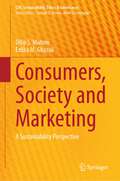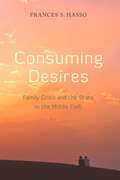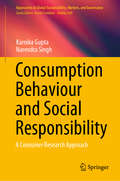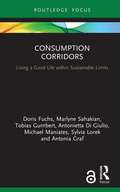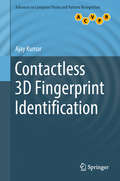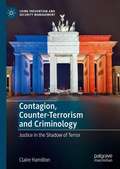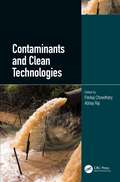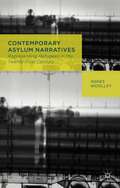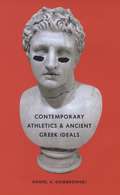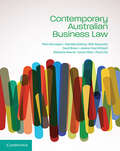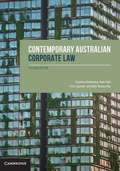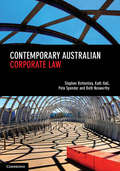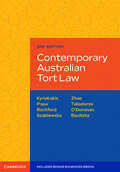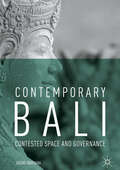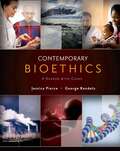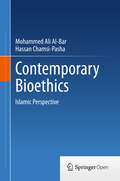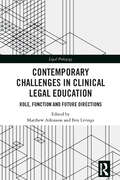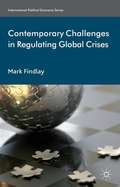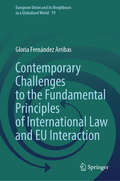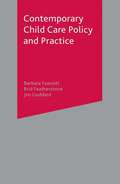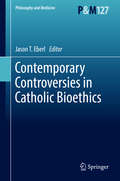- Table View
- List View
Consumers, Society and Marketing: A Sustainability Perspective (CSR, Sustainability, Ethics & Governance)
by Dilip S. Mutum Ezlika M. GhazaliEnvironment and social responsibility are paramount for any modern business strategy, and the field of marketing is adapting itself to the new focus on sustainability. The study of the interface between consumers, society, and marketing is crucial for understanding the complex interactions between individuals and the products and services they consume and the resulting implications. In this book, the authors delve into the latest research and theories on the subject, providing insight into the various factors that shape consumer behavior and the broader impacts of marketing on society. Whether you are a student, professional, or simply curious about the topic, this book will provide a valuable resource for your learning and exploration. Instead of treating ethical foundations and critical marketing perspectives separately, this book merges them and takes a broader sustainability perspective. It examines the various ways in which businesses are incorporating sustainability into their marketing strategies, and the impact these efforts are having on consumers, the economy, and the planet. Topics covered in this book include: Evolution of marketing thoughtCritique of marketingSustainable marketingSocial marketingEvolving consumer representations and roles, and many more
Consuming Desires: Family Crisis and the State in the Middle East
by Frances HassoOver the course of the twentieth century, most Middle East states adopted a shari'a-based system for recognizing marriages. Partly in reaction to these dynamics, new types of marriage that evade the control of the state and religious authorities have emerged. These marriages allow for men and women to engage in sexual relationships, but do not require that they register the marriage with the state, that they live together, or that the man be financially responsible for the wife or household. In Consuming Desires, Frances Hasso explores the extent to which these new relationship forms are used and to what ends, as well as the legal and cultural responses to such innovations. She outlines what is at stake for the various groups—the state, religious leaders, opposition groups, young people, men and women of different classes and locations, and feminist organizations—in arguments for and against these relationship forms.
Consumption Behaviour and Social Responsibility: A Consumer Research Approach (Approaches to Global Sustainability, Markets, and Governance)
by Narendra Singh Karnika GuptaThis book investigates the concept of consumer social responsibility (CnSR) by considering the combination of ‘consumption behaviour’ and ‘social responsibility’. It puts forward a theory of responsible consumption behaviour, then models and empirically tests this theory using quantitative research methods. In so doing, the book offers a new consumer behaviour model: the C-A-C-B (Concern-Attitude-Commitment-Behaviour) model. The book appeals to readers interested in consumer behaviour, research methodologies, social responsibility, corporate social responsibility, segmentation and profiling, sustainability, and structural equation modelling with path analysis and confirmatory factor analysis. The book also offers concrete recommendations that will benefit businesses and governments alike.
Consumption Corridors: Living a Good Life within Sustainable Limits (Routledge Focus on Environment and Sustainability)
by Antonia Graf Sylvia Lorek Marlyne Sahakian Antonietta Di Giulio Doris Fuchs Michael Maniates Tobias GumbertConsumption Corridors: Living a Good Life within Sustainable Limits explores how to enhance peoples’ chances to live a good life in a world of ecological and social limits. Rejecting familiar recitations of problems of ecological decline and planetary boundaries, this compact book instead offers a spirited explication of what everyone desires: a good life. Fundamental concepts of the good life are explained and explored, as are forces that threaten the good life for all. The remedy, says the book’s seven international authors, lies with the concept of consumption corridors, enabled by mechanisms of citizen engagement and deliberative democracy. Across five concise chapters, readers are invited into conversation about how wellbeing can be enriched by social change that joins "needs satisfaction" with consumerist restraint, social justice, and environmental sustainability. In this endeavour, lower limits of consumption that ensure minimal needs satisfaction for all are important, and enjoy ample precedent. But upper limits to consumption, argue the authors, are equally essential, and attainable, especially in those domains where limits enhance rather than undermine essential freedoms. This book will be of great interest to students and scholars in the social sciences and humanities, and environmental and sustainability studies, as well as to community activists and the general public.
Contactless 3D Fingerprint Identification (Advances in Computer Vision and Pattern Recognition)
by Ajay KumarThis important text/reference presents the first dedicated review of techniques for contactless 3D fingerprint identification, including novel and previously unpublished research. The text provides a systematic introduction to 3D fingerprint identification, covering the latest advancements in contactless 2D and 3D sensing technologies, and detailed discussions on each key aspect in the development of an effective 3D fingerprint identification system.Topics and features: introduces the key concepts and trends in the acquisition and identification of fingerprint images, and a range of 3D fingerprint imaging techniques; proposes a low-cost method for online 3D fingerprint image acquisition, and an efficient 3D fingerprint imaging approach using coloured photometric stereo; describes pre-processing operations on point cloud 3D fingerprint data, and explains the specialized operations for reconstructing 3D fingerprints from live finger scans; examines the representation of minutiae in 3D space, providing details on recovering these features from point cloud data, and on matching such 3D minutiae templates; reviews various 3D fingerprint matching methods, including binary surface code-based approaches and a tetrahedron-based matching approach; discusses the uniqueness of 3D fingerprints, evaluating the benefits of employing 3D fingerprint identification over conventional 2D fingerprint techniques.This unique work is a must-read for all researchers seeking to make further advances in this area, towards the exciting opportunities afforded by contactless 3D fingerprint identification for improving the hygiene, user convenience, and matching accuracy of fingerprint biometric technologies.
Contagion, Counter-Terrorism and Criminology: Justice in the Shadow of Terror (Crime Prevention and Security Management)
by Claire HamiltonThis book considers the impact of post 9/11 counter-terrorism laws outside of the counter-terrorism context, a process described here as ‘contagion’. It does so via a detailed empirical examination of the impact of counter-terrorism measures on the criminal justice systems of three selected EU countries with varying histories and experience of terrorism, namely, the UK, France and Poland. In particular, the book explores the synergistic relationship between counter-terrorism measures and control measures aimed at ‘ordinary’ crimes and asks what the implications are for the direction of travel of the criminal law in general. It probes the hegemonic power of terrorism and the securitisation agenda more broadly and discusses the implications for criminology as a discipline – does it, for example, have a role in social contestation of contagion? This book will be suitable for academics and students interested in political violence, terrorism and counterterrorism as well as practitioners and experts working in the area.
Contaminants and Clean Technologies
by Pankaj Chowdhary Abhay RajContaminants and Clean Technologies provides valuable information on environmental contaminants such as industrial pollutants, micropollutants, pesticides, endocrine disruptors, pharmaceuticals, toxins, and hormones. It focuses on the various types of environmental contaminants discharged from various sources; their toxicological effects in environments, humans, animals, and plants; and their removal methods. It also covers, comprehensively, information on the contaminants released by various industries and agricultural practices, which cause severe threats to the environment. Features of the book: Elucidates systematic information on various types of environmental contaminants, and their fate and consequences Discusses contaminants such as endocrine disruptors, pharmaceutical waste, and personal care products Provides an overview of physicochemical and biological treatment technologies for sustainable development Details recent research finding in the area of environmental contaminants and their future challenges
Contemporary Asylum Narratives
by Agnes WoolleyContemporary Asylum Narratives marks a transition from traditional modes of diasporic belonging to the need for identifications that encompass the statelessness of refugees and asylum seekers. This book explores representations of asylum seekers and refugees in twenty-first century literature, film and theatre.
Contemporary Athletics & Ancient Greek Ideals
by Daniel A. DombrowskiDespite their influence in our culture, sports inspire dramatically less philosophical consideration than such ostensibly weightier topics as religion, politics, or science. Arguing that athletic playfulness coexists with serious underpinnings, and that both demand more substantive attention, Daniel Dombrowski harnesses the insights of ancient Greek thinkers to illuminate contemporary athletics. Dombrowski contends that the ideas of Plato, Aristotle, and Plotinus shed important light on issues—such as the pursuit of excellence, the concept of play, and the power of accepting physical limitations while also improving one’s body—that remain just as relevant in our sports-obsessed age as they were in ancient Greece. Bringing these concepts to bear on contemporary concerns, Dombrowski considers such questions as whether athletic competition can be a moral substitute for war, whether it necessarily constitutes war by other means, and whether it encourages fascist tendencies or ethical virtue. The first volume to philosophically explore twenty-first-century sport in the context of its ancient predecessor, Contemporary Athletics and Ancient Greek Ideals reveals that their relationship has great and previously untapped potential to inform our understanding of human nature.
Contemporary Australian Business Law
by David Brown Beth Nosworthy Jessica Viven-Wilksch Alexandra Wawryk Mark Giancaspro Gabrielle Golding Sylvia Villios Paula ZitoAustralian businesses operate within a complex legal environment, so it's important students and professionals understand their legal obligations. Contemporary Australian Business Law is an authoritative text that makes key legal concepts accessible to business students, while maintaining academic rigour. Written for business students new to studying business law, this text introduces the fundamental legal topics encountered in business, including contracts, business structures, taxation, property and employment. Discussion in each chapter strikes a balance between accessibility and detail to assist understanding of these complex legal issues. A hypothetical scenario running through each chapter scaffolds learning and provides relevant real-world examples of the law in practice. Each chapter includes margin definitions, case boxes that guide students through landmark business law cases, and practice problems that test students' ability to apply their knowledge to realistic situations. Written by experts, Contemporary Australian Business Law is an essential introduction to the Australian legal system for business students.
Contemporary Australian Corporate Law
by Stephen Bottomley Kath Hall Peta Spender Beth NosworhtyContemporary Australian Corporate Law is a highly-regarded introduction to corporate law in Australia that provides an authoritative, contextual and critical analysis of the law governing Australian corporations and financial markets. It explores the rules, principles, doctrines and policies that constitute corporate law in Australia within their legal, social, economic and political contexts. Clearly and precisely written, this edition has been thoroughly updated and refined to reflect current Australian corporate law, including recent case law, changes to the Corporations Act 2011 and the impact on the corporate sector of the Financial Services Royal Commission. Written by leading legal scholars, Contemporary Australian Corporate Law will assist students to develop a critically informed understanding of corporate law and the role of corporations in contemporary society.
Contemporary Australian Corporate Law
by Stephen Bottomley Kath Hall Peta Spender Beth NosworthyContemporary Australian Corporate Law provides an authoritative, contextual and critical analysis of Australian corporate and financial markets law, designed to engage today's LL. B. and JD students. Written by leading corporate law scholars, the text provides a number of features including: a well-structured presentation of topics for Australian corporate law courses, consistent application of theory with discussion of corporate law principles (both theoretical and historical), comprehensive discussion of case law with modern examples, and integration of corporate law and corporate governance, all with clarity, insight and technical excellence. Central concepts are enhanced with dynamic and relevant discussions of corporate law in context, including debates relating to the role of corporations in society, the global convergence of corporate law as well as corporations and human rights. Exploring the social, political and economic forces which shape modern corporations law, Contemporary Australian Corporate Law encourages a forward-thinking approach to understanding key concepts within the field.
Contemporary Australian Tort Law
by Joanna Kyriakakis Tina Popa Francine Rochford Natalia Szablewska Xiaobo Zhao Jason Taliadoros Darren O'Donovan Lowell BautistaTort law is a dynamic area of Australian law, offering individuals the opportunity to seek legal remedies when their interests are infringed. Contemporary Australian Tort Law introduces the fundamentals of tort law in Australia today in an accessible, student-friendly way. This edition retains the logical coverage of key aspects of tort law and has been thoroughly updated to cover recent case law and legal developments. The chapter on defamation has been comprehensively updated to reflect recent amendments to uniform legislation and its application in common law. Self-assessment tools throughout the text encourage students to test and apply their knowledge of key concepts. These features include case questions and review questions throughout each chapter, as well as longer end-of-chapter hypothetical problems which consolidate students' application of key concepts to realistic contemporary scenarios. Written by a team of teaching experts, Contemporary Australian Tort Law is an engaging resource for students new to studying tort law.
Contemporary Bali: Contested Space and Governance
by Agung WardanaThis book offers a comprehensive examination of spatial and environmental governance in contemporary Bali. In the era of decentralisation, Bali's eight district governments and one municipality acquired a strong sense of authority to extract revenues from within their territorial borders while disregarding the impacts beyond them which has exacerbated environmental, cultural and institutional issues. These issues are addressed through reorganising space. In reality, however, such re-organisation has predominantly been in order to provide space for tourism investments and market expansion. The outcomes of reorganising space are in fact shaped by the dynamics of power that interface with increasingly complex legal and institutional structures. These complex structures provide more arenas for vested interests to manoeuvre, but at the same time provide different forms of legitimacy for local forces to challenge the dominant process. The book demonstrates the mechanisms through which social actors mobilise legal-institutional arrangements to advance their interests.
Contemporary Bioethics: A Reader with Cases
by Jessica Pierce George RandelsContemporary Bioethics: A Reader with Cases is the most cutting-edge bioethics anthology/casebook available. Incorporating introductions, readings, and cases that span the breadth of the discipline, this exceptional volume captures the spirit of bioethics as a rich, exciting, and continuously evolving field. Addressing all of the essential topics--including abortion, reproductive ethics, end-of-life care, research ethics, and the allocation of resources--it also moves beyond the "classic" approach of other books by extending into timely and provocative issues like terrorism, cosmetic surgery, immigration, genetic manipulations, links between first- and third-world health, and--unique to this book--environmental sustainability and climate change. In addition, Contemporary Bioethics is the only book of its kind that includes both philosophical and religious perspectives. <p><p>The text opens with a substantial introduction that presents key ethical principles, theories, and methods and shows students how to use these tools to frame and address ethical dilemmas in medicine. Covering the brief yet captivating history of the field, the introduction also considers the role of religion in the development of bioethics and examines differences between secular and religious modes of argumentation. Each of the seven topical chapters contains an in-depth introduction, a selection of concise readings representing a diverse range of moral perspectives (including feminist, religious, secular, and third-world), discussion questions, and a collection of full-length and provocative case studies that enable students to further explore the issues. <p><p>Ideal for introductory courses in bioethics and biomedical ethics, Contemporary Bioethics is supplemented by a Instructor's Manual on CD and a Companion Website containing resources for both students and professors, including chapter summaries, additional cases with discussion questions, ideas for further reading, vocabulary flashcards, self-quizzes, and more.
Contemporary Bioethics: Islamic Perspective
by Mohammed Ali Al-Bar Hassan Chamsi-PashaThis book discusses the common principles of morality and ethics derived from divinely endowed intuitive reason through the creation of al-fitr' a (nature) and human intellect (al-'aql). Biomedical topics are presented and ethical issues related to topics such as genetic testing, assisted reproduction and organ transplantation are discussed. Whereas these natural sources are God's special gifts to human beings, God's revelation as given to the prophets is the supernatural source of divine guidance through which human communities have been guided at all times through history. The second part of the book concentrates on the objectives of Islamic religious practice - the maqa' sid - which include: Preservation of Faith, Preservation of Life, Preservation of Mind (intellect and reason), Preservation of Progeny (al-nasl) and Preservation of Property. Lastly, the third part of the book discusses selected topical issues, including abortion, assisted reproduction devices, genetics, organ transplantation, brain death and end-of-life aspects. For each topic, the current medical evidence is followed by a detailed discussion of the ethical issues involved.
Contemporary Business Law
by Henry R. CheesemanPrimarily a text for courses in Business Law, Contemporary Business Law can also serve as a handy resource/reference for newcomers to the world of business. #65533; Take students beyond rote memorization and into true understanding of the concepts and their implications. #65533; This motivating, up-to-date text presents business law, ethics, and the legal environment in a way that intrigues students, spurs them to ask questions, and takes them beyond rote memorization as they learn the issues and concepts. With its emphasis on covering online law and e-commerce as key parts of the legal environment--as well as today's social, ethical, and international issues that are important to the study of business law--it's the ideal text for your one- or two-semester undergraduate course in Business Law. #65533; This text provides a better teaching and learning experience--for you and your students. Here's how: Tailor the material to your specific course with the Custom Database option. Draw students into the material with a rich selection of cases. Address issues critical to the field of business law today.
Contemporary Challenges in Clinical Legal Education: Role, Function and Future Directions (Legal Pedagogy)
by Ben Livings Matthew AtkinsonThis edited book addresses contemporary challenges in clinical legal education (CLE), considering its role in legal education and in the broader community it serves. Written by experts from various international contexts, the book explores how the changing nature and requirements of legal practice alongside social and technological developments affect the pedagogy of clinical legal education. Chapters chart the development of clinical legal education across various jurisdictions and examine developments in programme design and supervision of and in CLE along with the role of CLE in the community. The authors also reflect on the dynamic and developing role of clinical legal education and offer recommendations for the future. This book will be essential reading for academics, researchers in clinical legal education, and those interested in legal education across the world. It will also be of interest to students of clinical legal education whose research requires a deeper understanding of the current themes and issues of the subject.
Contemporary Challenges in Regulating Global Crises
by Mark FindlayMark Findlay's treatment of regulatory sociability charts the anticipated and even inevitable transition to mutual interest which is the essence of taking communities from shared risk to shared fate. In the context of today's global crises, he explains that for the sake of sustainability, human diversity can bond in different ways to achieve fate.
Contemporary Challenges in the Jury System: A Comparative Perspective (Routledge Contemporary Issues in Criminal Justice and Procedure)
by Nicola MonaghanThis collection explores a variety of issues facing contemporary juries, bringing together innovative research from different disciplines and jurisdictions. The debate stems from a real concern that criticism of the jury may lead to a loss of public confidence in the institution and that this may renew government efforts to further restrict the role of the jury in criminal proceedings in England and Wales. This work offers an interdisciplinary approach presenting insights from legal, psychological and criminological perspectives, thus bypassing traditional borders and presenting a cohesive view. Issues discussed reflect the rapid advances in technology, changing dynamics and behaviours in society, and challenges that have been aggravated by the Covid-19 pandemic. Whilst the focus is primarily on juries in England, Wales, Scotland and across Ireland in terms of challenges and opportunities, the collection also invites a comparative perspective, drawing on experiences and related research in other jurisdictions. The book will be of interest to academics, researchers and policy-makers working in the areas of criminal law and procedure, criminal justice, criminology and psychology.
Contemporary Challenges to the Fundamental Principles of International Law and EU Interaction (European Union and its Neighbours in a Globalized World #19)
by Gloria Fernández ArribasThis book, finished in September 2023, addresses the fundamental principles enshrined in Resolution 2625 (XXV): sovereignty, the principle of non-intervention, the prohibition of the use of force, and self-determination. Studying these principles can help us understand some of the main features of international law and the international community in the 21st century: the role of traditional and new subjects alike; the sources of international law; issues of international responsibility; and new international challenges. For this purpose, the book analyses in each chapter the main controversial practices regarding principles. In addition, a section is devoted to an analysis of the particular relationship between the European Union and these principles, given the EU's unique role as an important evolution in international law as both a subject and treaty maker. Further, the EU provides an example of the institutionalisation of the international community and helps to solidify the concept. The book is chiefly intended for experts on International Law. Its purpose is to offer an updated vision of the international community through analysis of the core principles of international law, highlighting contradictions and problems regarding its application and interpretation. The book should also be of great interest and value to those starting careers in international law, offering them key insights into the international community and the roots of the international system.
Contemporary Challenges to the Laws of War
by Nigel D. White Caroline Harvey James Summers Caroline Harvey James SummersThe laws of war are facing new challenges from emerging technologies and changing methods of warfare, as well as the growth of human rights and international criminal law. International mechanisms of accountability have increased and international criminal law has greater relevance in the calculations of political and military leaders, yet perpetrators often remain at large and the laws of war raise numerous normative, structural and systemic issues and problems. This edited collection brings together leading academic, military and professional experts to examine the key issues for the continuing role and relevance of the laws of war in the twenty-first century. Marking Professor Peter Rowe's contribution to the subject, this book re-examines the purposes of the laws of war and asks whether existing laws found in treaties and customs work to achieve these purposes and, if not, whether they can be fixed by specific reforms or wholesale revision.
Contemporary Child Care Policy and Practice
by Barbara Fawcett Brid Featherstone Jim GoddardThis important text will provide a critical analysis of contemporary developments in child care policy under New Labour and the resulting policy and practice implications. The authors will draw on sociological debates, the growing children's rights literature and wider developments within social policy in order to provide a thorough and balanced guide to contemporary developments in this rapidly changing field. Ideologies behind recent initiatives in a wide range of practice areas are explored, and the implementation of key developments are appraised. This will be primary reading for all students specializing in work with children and their families.
Contemporary Christian Morality: Real Questions, Candid Responses
by Richard C. SparksIn a question-and-answer format, this book presents answers to 100 of the most pressing questions in Christian (Catholic, Protestant, and Anglican) ethics. A reliable introduction that takes on hot-button issues, including sexuality and politics, in a thoughtful and clear way.
Contemporary Controversies in Catholic Bioethics (Philosophy and Medicine #127)
by Jason T. EberlThis volume comprises various viewpoints representing a Catholic perspective on contemporary practices in medicine and biomedical research. The Roman Catholic Church has had a significant impact upon the formulation and application of moral values and principles to a wide range of controversial issues in bioethics. Catholic leaders, theologians, and bioethicists have elucidated and marshaled arguments to support the Church's definitive positions on several bioethical issues, such as abortion, euthanasia, and reproductive cloning. Not all bioethical issues, however, have been definitively addressed by Catholic authorities, and some Church teachings allow for differing applications in diverse circumstances. Moreover, as new biomedical technologies emerge, Church authorities rely on experts in science, medicine, philosophy, theology, law, and other disciplines to advise them. Such experts continue to debate issues related to reproduction, genetics, end-of-life care, and health care policy. This volume will be a valuable resource for scholars in bioethics or Catholic studies, who will benefit from the nuanced arguments offered based on the latest research. This volume is also instructive for students entering the field to become aware of the founding philosophical and theological principles informing the Catholic bioethical worldview.
